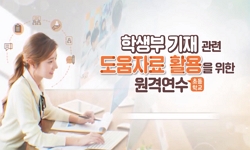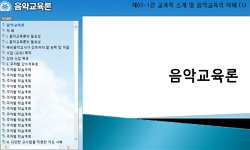The purpose of this study is to investigate the actual status of music teacher system and perception of elementary music teachers and school administrators in elementary schools in Gyeonggi Province. The research questions for this study are as follow...
http://chineseinput.net/에서 pinyin(병음)방식으로 중국어를 변환할 수 있습니다.
변환된 중국어를 복사하여 사용하시면 됩니다.
- 中文 을 입력하시려면 zhongwen을 입력하시고 space를누르시면됩니다.
- 北京 을 입력하시려면 beijing을 입력하시고 space를 누르시면 됩니다.
경기도 지역 음악교과 전담교사제의 실태와 인식 = A study on the status and perception of the music teacher system in Gyeonggi Province
한글로보기https://www.riss.kr/link?id=T16380663
- 저자
-
발행사항
인천 : 경인교육대학교 교육전문대학원, 2022
-
학위논문사항
학위논문(박사) -- 경인교육대학교 교육전문대학원 , 음악교육 초등음악교육과 , 2022. 8
-
발행연도
2022
-
작성언어
한국어
-
주제어
초등학교 ; 음악교육 ; 음악교과 전담교사 ; 음악교과 전담교사제 ; 음악교사 전문성
-
발행국(도시)
인천
-
형태사항
223 ; 26 cm
-
일반주기명
지도교수: 권덕원,석문주
-
UCI식별코드
I804:41085-200000643162
- 소장기관
-
0
상세조회 -
0
다운로드
부가정보
다국어 초록 (Multilingual Abstract)
The purpose of this study is to investigate the actual status of music teacher system and perception of elementary music teachers and school administrators in elementary schools in Gyeonggi Province. The research questions for this study are as follows: (1) What is the actual status of the music teacher system in Gyeonggi Province? (2) How do music teachers and school administrators in elementary schools perceive music teacher system? (3) What is the difference between the perceptions of music teachers and the perceptions of school administrators regarding the music teacher system? (4) Based on the problems and improvement points of the music teacher system perceived by music teachers and school administrators, what actions could be taken to stimulate the music teacher system?
For this study, references about subject teacher system, music teacher system, and professionalism of music teachers were reviewed. Subsequently, the transition of music teacher system was divided into preparatory stage, implementation stage I, and implementation stage II. In addition, theoretical basis for this study was retained by exploring professionalism of music teachers in elementary schools. Consequently, surveys for music teachers and school administrators were developed to investigate the actual status and perceptions of music teacher system. Furthermore, an interview tool was developed to find out the perception of music teacher system from music teachers who had experience.
The subjects of the survey were 275 music teachers and 253 school administrators who are currently working in elementary schools affiliated with Gyeonggi Provincial Office of Education that have music teacher system. Surveys were distributed to music teachers and school administrators from December 30, 2020 to February 5, 2021. 172 copies (62.5%) of the surveys for music teachers and 220 copies (87.0%) of surveys for school administrators were retrieved. For in-depth analysis of the survey results, interviews with 22 music teachers were conducted from May 24, 2021 to June 18, 2021 who wished to be interviewed among the survey respondents.
The survey analysis on the actual status and perception of music teacher system was quantitatively analyzed using descriptive statistics, t-test, One-Way ANOVA, and chi-squared test(χ²) using SPSS 28. The interview survey results were analyzed qualitatively by coding data from recorded transcription and interview notes.
As a result of analyzing the actual status of music teacher system and perceptions of music teachers and school administrators, the following conclusions were drawn.
First, as a result of analyzing the actual status of music teacher system, music teachers preferred music subject and wanted to be music teachers due to their professionalism. However, there were difficulties resulting from burden of school work and teaching multiple subjects. School administrators tried to operate music teacher system by selecting professional music teachers according to the needs of classroom teachers. There are a number of music teachers who teach music in a music classroom that is not equipped with musical instruments and soundproofing. In addition, contents from online were being used in class instead of musical instruments. Music teachers value practical skills and they are developing their professionalism by applying music teaching methods and materials to their music classes. For music teacher system to be activated, it is necessary to prepare conditions for music teachers to develop their professionalism and to teach music subject intensively.
Second, as a result of analyzing the perception of music teacher system, music teachers and school administrators are aware of needing music teacher system for students' musical growth and development. However, music teachers have difficulties due to other school work, student guidance, music classroom environment, teacher treatment, and relationship with classroom teachers. School administrators recognize the importance of music subject specialization of music teachers, but it is difficult to secure teachers with music professionalism and classroom teachers do not prefer music teacher system which makes it hard for the school to operate music teacher system. In order to stimulate music teacher system, music classroom environment and treatment of teachers are important, but it is important that professional music teachers are assigned priorly so that school members are aware of necessity for music teacher system.
Third, as a result of analyzing the difference between the actual status of music teacher system and perceptions of music teachers and school administrators, there were perception gap in criteria for music selection, music room facilities, perception of the activation of music teacher system, and support from the school and Office of Education. There must be a clear standard for objective judgment as to whether a teacher has the right qualification for being a music teacher. School administrators consider music teacher system more important than that of music teachers and perceive that music classroom facilities and support for music classes are in good condition. There should be support for musical instruments and learning materials required for music class through communication with music teachers who actually teach music classes.
Fourth, as a result of analyzing the interview survey conducted with music teachers for an in-depth understanding of music teacher system, the music teachers feel rewarding and satisfied while teaching music but face various difficulties as a music teacher which makes it difficult to continue to be music teachers. In spite of the difficulties, music teachers are continuously striving for musical growth of their students and developing their professionalism. School members are required to provide an opportunity for professional music teachers to do better in music classes, and to cooperate so that the music teacher system could be well established to provide music education for children.
As a result of analyzing the actual status and perceptions of music teacher system, music teachers must develop their professionalism with passion and sense of duty and work hard to do well in music classes in order to stimulate the music teacher system. School members should raise awareness of the necessity of music teacher system, and school administrators should consider music subject specialization preferentially when assigning music teachers. The Office of Education should provide institutional support so that professional music teachers can continue to take charge of music subject. At the beginning of implementation of subject teacher system, training was conducted at the Office of Education so that music teachers could have professionalism along with other support. The Office of Education needs to create a talent pool to manage music teachers as part of supervision over the operation of music teacher system. It is necessary to secure professional music teachers priorly, so that music education can be continuously conducted with enough music teachers. With the efforts of music teachers, school members’ awareness, and support from the Office of Education, good quality music education will be realized systematically by the music teachers.
국문 초록 (Abstract)
본 연구의 목적은 경기도 지역 초등학교 음악교과 전담교사제의 실태와 음악교과 전담교사와 학교 관리자의 인식을 조사하는 것이다. 본 연구를 위한 연구 문제는 1) 경기도 지역 음악교과 ...
본 연구의 목적은 경기도 지역 초등학교 음악교과 전담교사제의 실태와 음악교과 전담교사와 학교 관리자의 인식을 조사하는 것이다. 본 연구를 위한 연구 문제는 1) 경기도 지역 음악교과 전담교사제의 실태는 어떠한가? 2) 음악교과 전담교사제에 대한 음악교과 전담교사와 관리자의 인식은 어떠한가? 3) 음악교과 전담교사제에 대한 음악교과 전담교사와 관리자의 인식의 차이는 어떠한가? 4) 음악교과 전담교사와 관리자가 인식한 음악교과 전담교사제의 문제점과 개선점을 바탕으로 한 음악교과 전담교사제의 활성화 방안은 무엇인가?로 설정하였다.
본 연구를 위하여 교과전담제, 음악교과 전담교사제, 음악교사의 전문성에 관한 문헌을 고찰하였다. 이를 통해 교과전담제의 변천과정을 준비 단계와 시행 Ⅰ단계, 시행 Ⅱ단계로 나누어 살펴보았으며, 음악교과 전담교사의 전문성을 탐색하여 연구를 위한 이론적 근거를 마련하였다. 이에 따라 음악교과 전담교사제의 실태와 인식을 조사하기 위하여 음악교과 전담교사 설문지와 관리자 설문지를 개발하였으며, 음악교과 전담교사의 경험을 통한 음악교과 전담교사제의 인식을 알아보기 위하여 면담 도구를 개발하였다.
설문 조사 연구 대상은 경기도교육청 소속 초등학교 중에서 음악교과 전담교사제를 운영하는 학교의 음악교과 전담교사 275명, 관리자 253명이다. 2020년 12월 30일부터 2021년 2월 5일까지 음악교과 전담교사와 관리자에게 설문지를 배부하였고, 음악교과 전담교사 설문지는 172부(62.5%)를 회수하였고, 관리자는 220부(87.0%)를 회수하였다. 설문결과에 대한 심층적인 이해를 위하여 설문 응답자 중 면담을 희망한 음악교과 전담교사 22명을 대상으로 2021년 5월 24일부터 2021년 6월 18일까지 심층 면담을 실시하였다.
음악교과 전담교사제 실태 및 인식에 대한 설문 조사 분석은 SPSS 28을 이용하여 기술통계와 t검정, 일원 변량분석(ANOVA), 카이검정(χ²)으로 양적 분석하였다. 면담 조사 결과는 녹음 전사, 면담 메모 등의 자료를 코딩하여 질적 분석하였다.
음악교과 전담교사제의 실태와 음악교과 전담교사와 관리자의 인식을 분석한 결과, 다음과 같은 결론을 도출하였다.
첫째, 음악교과 전담교사제의 실태를 분석한 결과, 음악교과 전담교사는 음악을 선호하고 전문성이 있어서 음악전담을 희망하였으나, 학교 업무 부담과 복수 교과 지도로 어려움이 있다. 관리자는 학급담임들의 요구에 따라 전문성 있는 음악교과 전담교사를 선정하여 음악교과 전담교사제를 운영하고자 하였다. 악기 구비와 방음시설이 안 된 음악실에서 음악수업을 하는 음악교과 전담교사가 다수 있고, 악기 외에도 온라인 콘텐츠를 수업에 많이 활용하고 있었다. 음악교과 전담교사는 음악교사의 전문성으로 실기 능력을 중요시하며, 음악교수법과 자료를 수업에 적용하면서 전문성을 개발하고 있다. 음악교과 전담교사제를 위하여 전문성이 있는 음악교과 전담교사가 전문성을 개발하며 음악교과를 집중적으로 지도할 수 있는 여건이 마련되어야 할 것이다.
둘째, 음악교과 전담교사제에 대한 인식을 분석한 결과, 음악교과 전담교사와 관리자는 학생의 음악적 성장 발달을 위해 음악교과 전담교사제가 필요하다고 인식한다. 하지만, 음악교과 전담교사는 학교 업무, 학생지도, 음악수업환경, 교사 처우, 학급담임과의 관계 등으로 어려움이 있다. 관리자는 음악교과 전문성이 있는 교사를 전담교사로 배정하고자 한다. 그러나 음악교과 전문성이 있는 교사 확보가 어렵고, 학급 담임들이 음악교과를 전담교과로 비선호하여 음악교과 전담교사제 운영에 어려움이 있다고 인식한다. 음악교과 전담교사제가 활성화되기 위해서는 음악실 환경, 교사 처우도 중요하지만, 전문성 있는 음악교과 전담교사가 우선 배정되어, 학교 구성원들이 음악교과의 전담교육 필요에 대한 인식을 갖도록 하는 것이 중요하다.
셋째, 음악교과 전담교사제의 실태와 음악교과 전담교사와 관리자의 인식 차이를 분석한 결과, 음악전담 선정기준, 음악실 시설, 음악교과 전담교사제 활성화에 대한 인식, 학교 및 교육청 차원의 지원에 대하여 인식의 차이가 있었다. 학교마다 음악교과 전담을 선정할 때, 음악교과 전문성을 갖춘 교사라는 객관적인 판단을 할 수 있는 명확한 기준이 있어야 하겠다. 관리자는 음악교과 전담교사제 활성화에 대한 인식이 음악교과 전담교사보다 높고 음악실 시설, 음악수업을 위한 지원이 잘 된다고 인식한다. 실제 수업을 하는 음악교과 전담교사와 서로 대화와 협의를 통하여 음악수업에 필요한 악기와 학습자료에 대한 지원이 있어야 할 것이다.
넷째, 음악교과 전담교사제에 대한 심도 있는 이해를 위하여 음악교과 전담교사를 대상으로 실시한 면담 조사를 분석한 결과, 음악교과 전담교사는 음악을 가르치면서 보람과 만족을 느끼지만, 전담교사로서 겪는 여러 가지 어려움은 음악전담을 지속하기 어렵게 한다. 이런 어려움에도 불구하고 음악교과 전담교사는 학생들의 음악적 성장을 위하여 지속적으로 노력하며 전문성을 개발하고 있다. 학교 구성원들은 전문성 있는 음악교과 전담교사가 음악수업을 잘 할 수 있도록 기회를 주며, 음악교과 전담교사제가 잘 이루어져 아이들의 음악적 성장이 있는 음악교육이 될 수 있도록 협조하는 자세가 필요하다.
음악교과 전담교사제의 실태와 인식을 분석한 결과, 음악교과 전담교사제가 활성화되기 위하여 음악교과 전담교사는 열정과 사명감을 가지고 전문성을 개발하며, 음악수업을 잘 하기 위해 노력해야 할 것이다. 학교 구성원들은 음악교과 전담교육의 필요성에 대한 인식을 높이고, 관리자는 음악교과 전담교사 배정 시 음악교과 전문성을 우선적으로 고려하여야 한다. 교육청에서는 전문성 있는 음악교과 전담교사가 음악전담을 지속할 수 있도록 제도적 뒷받침을 해 주어야 한다. 교육청에서는 음악교과 전담교사제 운영에 대한 관리 감독의 일환으로 인력풀을 만들어 음악교과 전담교사를 관리할 필요가 있다. 전문성 있는 음악교과 전담교사를 먼저 확보하여, 음악전담 교육이 지속적으로 이루어지도록 학교에 음악전담 정원이 확보될 수 있도록 지원이 필요하다. 이러한 음악교과 전담교사의 노력과 학교 구성원들의 인식, 교육청의 지원이 있을 때 음악교과 전담교사제는 음악교과 전담교사에 의해 체계적으로 음악교육이 잘 이루어질 것이다.
목차 (Table of Contents)
- Ⅰ. 서론 1
- 1. 연구의 필요성과 목적 1
- 2. 연구 문제 4
- 3. 연구 내용 4
- Ⅰ. 서론 1
- 1. 연구의 필요성과 목적 1
- 2. 연구 문제 4
- 3. 연구 내용 4
- 4. 연구의 제한점 5
- Ⅱ. 이론적 배경 6
- 1. 교과전담제의 변천 6
- 가. 교과전담제 준비 단계 7
- 나. 교과전담제 시행 Ⅰ단계 13
- 다. 교과전담제 시행 Ⅱ단계 17
- 2. 음악교과 전담교사의 전문성 22
- 가. 음악교사 전문성 23
- 나. 음악교과 전담교사 전문성 28
- 3. 선행연구 고찰 31
- 가. 교과전담제에 관한 연구 31
- 나. 음악교과전담제에 관한 연구 34
- 다. 음악교사 전문성에 관한 연구 36
- Ⅲ. 연구 방법 38
- 1. 연구 대상 38
- 가. 설문 조사 연구 대상 38
- 나. 면담 조사 연구 대상 40
- 2. 연구 절차 43
- 3. 연구 도구 45
- 가. 설문지 개발 46
- 나. 면담 도구 개발 59
- 4. 자료 수집 61
- 가. 설문 실시 61
- 나. 면담 실시 62
- 5. 자료 분석 63
- 가. 설문 조사 분석 63
- 나. 면담 조사 분석 65
- Ⅳ. 양적 연구 결과 및 분석 74
- 1. 연구 대상자의 일반적 사항 74
- 가. 음악교과 전담교사의 일반적 사항 74
- 나. 관리자의 일반적 사항 78
- 2. 음악교과 전담교사제 실태 분석 79
- 가. 실태에 대한 음악교과 전담교사의 의견 80
- 나. 실태에 대한 관리자의 의견 108
- 다. 음악교과 전담교사와 관리자의 의견 비교 114
- 3. 음악교과 전담교사제 인식 분석 117
- 가. 음악교과 전담교사의 인식 118
- 나. 관리자의 인식 152
- 다. 음악교과 전담교사제에 대한 인식 비교 165
- Ⅴ. 질적 자료 분석 결과 171
- 1. 음악교과 전담교사의 보람 171
- 2. 음악교과 전담교사가 겪는 어려움 177
- 3. 음악수업 향상을 위한 의지와 노력 187
- Ⅵ. 결론 및 후속 연구 193
- 1. 결론 193
- 2. 후속 연구 196
- 참고문헌 198
- 부록 206
- 1. 음악교과 전담교사용 설문지 207
- 2. 관리자용 설문지 215
- ABSTRACT 219













